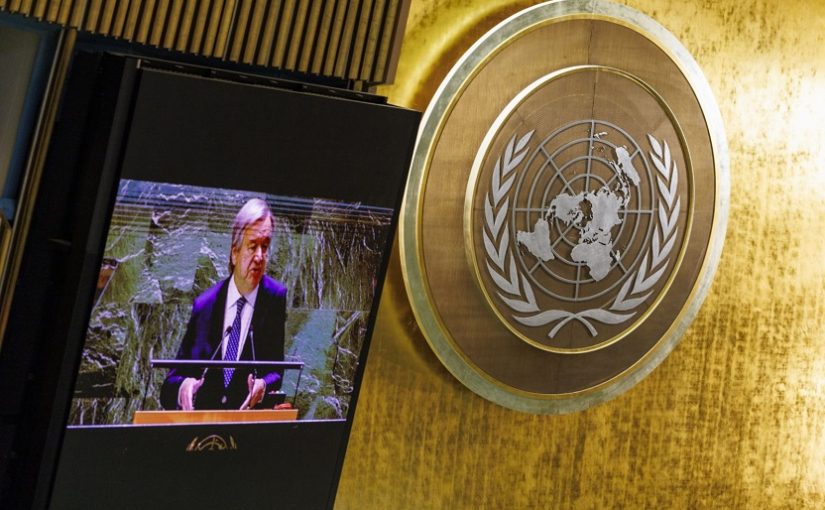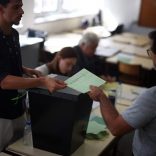Portugal's far-right underwhelms in local elections, wins three mayorships
Portugal: Family of Portuguese hostage held by Hamas appeal to UN chief to help

Image: Lusa
Relatives of Hamas hostages on Monday called on António Guterres and the United Nations to use “the power they have” to free the men, women and children who have been held captive for 100 days and criticised the silence of humanitarian organisations.
At a live press conference from Tel Aviv, Israel, organised by the Portuguese-Israeli association Aliados, in Porto, the mother and brother of two of the more than 110 hostages taken by the Palestinian Islamist movement Hamas, who are still in captivity, demanded the “immediate release” of all the detainees and warned of what they consider to be “a problem for the world” and not just for Israel.
One hundred days ago, on 7 October, Hamas fighters invaded Israeli territory in an unprecedented attack, killed 1,130 people and kidnapped more than 200 citizens of various nationalities, including Portuguese, of whom around 110 are still being held captive.
“We demand that everyone who considers themselves human do something to get those 110 people out of there. This is a matter for the world, not Israel,” appealed Omri Shtivi, brother of Idan, 28, one of the hostages held in Gaza and a Portuguese national.
Next to him, Sheill Shem Tov, mother of Omer Shem Tov, 21, who is also being held captive, appealed: “António Guterres, the United Nations (UN), do something. It’s unbelievable that nobody is talking about the situation of the hostages. Help them. Let the UN use its power to bring these people back,” she urged.
Minutes before the conversation with journalists, ALIADOS released six minutes of video footage that until now has only been shown on diplomatic and military channels. They are images taken by Hamas fighters who attacked Israel on 7 October.
They are “raw, ugly, bloody” images of bodies being torn apart and burnt, blood, houses being invaded, people being beaten and shown off, attackers celebrating.
In the video you can see part of the invasion of the music festival where most of the hostages were. They shot at the toilets, which were occupied, at cars that fled, at those who danced, at those who ran, at those who hid.
“My brother just went to a festival. He’s injured, we saw blood, we saw the holes in the car he was travelling in. All we know is that he’s alive and he’s there,” said Omri, who described Idan as a “kind young man, someone you can trust”.
Idan and his brother have Portuguese nationality and regret that the Portuguese government has no contact with them. Omri said that he had had contact with the minister of foreign affairs and some members of the Portuguese parliament “and that was it”.
“I hope that the Portuguese government is responsible, that it takes responsibility for its citizens around the world and not just those who are in Portugal. I hope they ask questions about this Portuguese citizen, that they show empathy,” he said.
For Omer’s mother, “life stopped” on 7 October: “Our mission, our life’s mission is to bring them home. My day is here [at the hostages’ family headquarters in Tel Aviv], here with people who understand my situation. We are together, happy for those who have been released but sad because my son is still there,” she explained.
“Hope continues” but, as Omri recognised, “there are days when anger and revolt” invade the relatives of those in captivity. “Today I feel powerless and angry. I don’t see the world’s leaders taking action. Where are the humanitarian organisations? Maybe tomorrow I’ll feel more hopeful,” he confessed.
Hamas is an organisation considered a terrorist by the United States, the European Union and Israel, which has been in power in the Gaza Strip since 2007. Israel retaliated for the attacks 100 days ago by declaring a war to eradicate the movement.
The supply of food, water, electricity and fuel to Gaza has been cut off and Israel has carried out daily bombardments, followed by a ground offensive in the north of the territory, which has since spread to the south.
The war between Israel and Hamas has so far left more than 23,000 people dead and more than 59,000 wounded in the Gaza Strip, most of them civilians, according to the latest figures from the local authorities, and around 1.9 million displaced (around 85% of the population), according to the UN, plunging the overcrowded and impoverished Palestinian enclave into a serious crisis.
“Sometimes I go to his room and talk to him, tell him he has to be brave, that we’re doing everything to get him back. Sometimes I don’t believe myself. I left the room the way he left it, when he left I told him he had to tidy it up when he got back,” said Sheill.
“I’m still waiting. Bring them back now,” she emphasised.












Leave a Reply
Be the First to Comment!
You must be logged in to post a comment.
You must be logged in to post a comment.